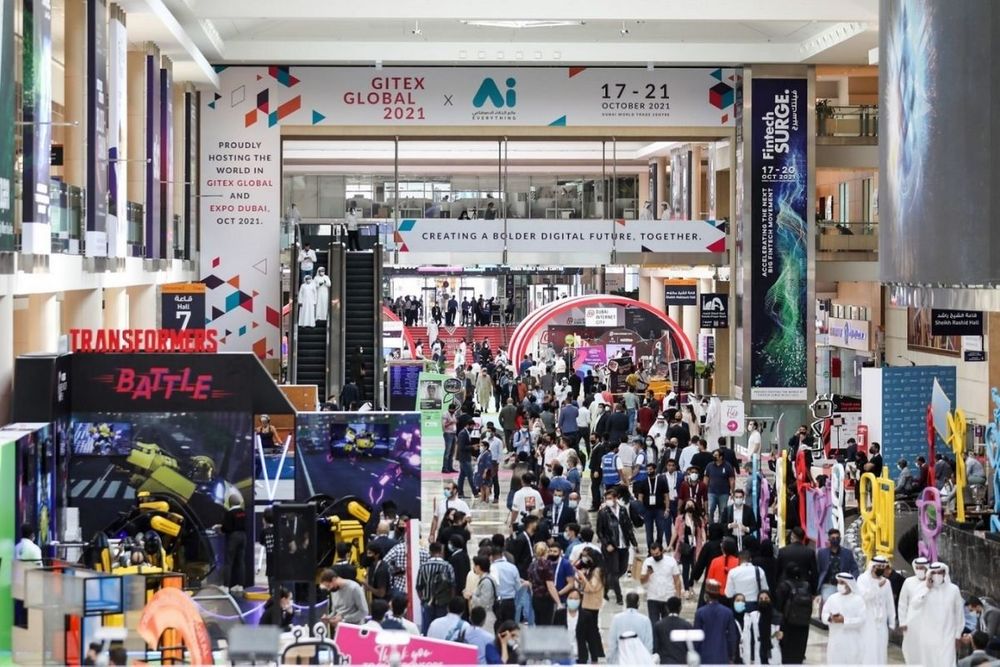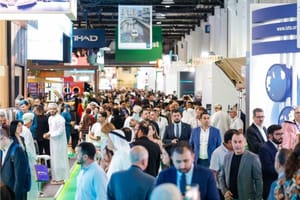GITEX Global 2021 provided a unique international opportunity for tech companies of all sizes the chance to meet and connect in person. The event highlighted mega tech trends shaping the region and the world, including artificial intelligence, fintech, blockchain, among others.
Region’s quest for innovation
With the aim of having the world’s largest per capita percentage of coders within 10 years, the UAE has announced October 29 as its annual ‘National Coders Day’. At the GITEX Global Leaders Vision, Omar Sultan Al Olama, Minister of State for Artificial Intelligence, Digital Economy and Remote Work Applications, highlighted the initiative and discussed plans for the UAE’s Coders’ Society, bringing together the 60,000 coders who are already residing in the UAE. He also believed that the country could excel in developing women coders, bringing new employment opportunities to the female population throughout the Emirates.
The Dubai Digital Authority revealed that the Dubai Paperless Strategy had met 98.86 per cent of its goals, including 43 government agencies going completely paperless. On December 12, the Dubai Government will issue its last paper transaction. Wesam Lootah, CEO of Smart Dubai Government Establishment, Digital Dubai, stated that the day would mark the completion of the Dubai Paperless Strategy, which started in 2018. He claimed that the strategy had saved 13 million hours of manual transactions and 325 million sheets of paper, equivalent to 39,000 trees.
The Abu Dhabi Digital Authority director-general, Dr Mohamed Abdelhameed Al Askar, also called for cross-border cooperation in maturing digital human rights. He stated that rights would include guaranteed internet access for everybody, with digital connectivity being optional. He also added that digital ethics law must mature to secure privacy, balance free expression with individual protection, place digital fluency at the centre of education, optimise digital consumer rights, and raise cybersecurity awareness.
Brigadier Khalid Nasser Al Razooqi, Director General of Artificial Intelligence at Dubai Police, outlined new initiatives aimed at making Dubai the safest city in the world which included the launch of a GPS bullet vehicle camera tracking system and the world’s first floating smart police station on the World Islands.
While Dubai’s Roads and Transport Authority presented AI-powered technology to ensure safer cycling tracks, Salem Al Marri, deputy director-general of the Mohammed Bin Rashid Space Centre, confirmed that Dubai would look to have the majority of components for its next satellite made locally by start-ups and SMEs.
The start-up's pavilion
GITEX Future Stars, the region’s largest tech event for start-ups, witnessed the participation of 600 companies and talent from the music, fashion, arts, and sports industries. The platform also opened up new avenues for economic diversification. The platform also provided new opportunities for economic diversification. Furthermore, entrepreneurs and investors in the Creative Economy discussed how technology might be leveraged to revolutionise the creative sector.
The Dubai World Trade also announced the rebranding of Gitex Future Stars to North Star Dubai.
During the event, Hub71, Abu Dhabi’s global tech ecosystem, formed a partnership with AWS to help tech start-ups build scalable and secure cloud-based services that would accelerate their growth.
Jida Itani, chief operating officer, Hub71, said:
“Our support infrastructure for the start-up's community continues to expand the more we learn about our founders’ needs. Joining forces with Amazon Web Services unleashes opportunities for our start-ups, who will be able to take more advantage of cloud solutions as they look at scaling their businesses.”
In addition, Azimut, in collaboration with Gellify Middle East, launched a MENA-focused VC Fund to raise $50m in capital for smart city, healthcare, digital commerce, fintech, industry 4.0, and tourism start-ups using technologies such as artificial intelligence, internet of things, blockchain, and cybersecurity.
The start-up's platform also inaugurated CodeInfinity – the region’s first and only developer event to empower young programmers. Microsoft announced a strategic partnership with industry leaders during the show to bridge the regional IT skills gap and address demand and supply challenges across businesses. In addition, the company collaborated with Oracle and Red Hat as founding partners for Gitex – CodeInfinity.
The event also witnessed a panel discussion on data-driven economic reasoning. The panel discussed how regulators, companies, and consumers cannot compromise on freedom of choice and must yet at all times offer ethical frameworks.
Towards a hybrid world
As the world looks forward hopefully towards the tapering of the pandemic, many people wonder about the future of businesses that have implemented new technologies. Many of these improvements are expected to be permanent, with features such as flexible scheduling that allows employees to work from home when necessary.
According to Gartner research, 75 per cent of hybrid or remote knowledge workers say their expectations for working flexibly have grown, and four out of ten employees are at risk of leaving if they are forced to return to an in-person office environment.
Haidi Nossair, senior director – client solutions group – MERAT, Dell Technologies, says,
“A hybrid work model is here to stay. And the best scenario is when you give that flexibility to your employees to work from home or anywhere. But in the hybrid work model, we need to address a couple of things. Firstly, the experience to continue to be productive with solutions and devices. Secondly, also to make sure the endpoint data centres are secured,”
With remote and hybrid work environments introducing new challenges, cybersecurity needs to remain a priority. To better understand the security demands of the emerging hybrid workplaces, Entrust polled 1,500 executives from the manager level to the C-suite and 1,500 full- and part-time workers at the entry and associate levels. The study interviewed workers in 10 countries across four global regions, revealing executives’ present intentions for the new hybrid workplace and employee perceptions on their work arrangements and the goals of their organisations. A total of 80 per cent of executives and 75 per cent of employees reported that their organisations are currently using a hybrid model or is remote and exploring a hybrid work style. However, 54 per cent of employees reported up to six instances of lost productivity owing to network access concerns, and leaders cite home internet security (21 per cent) and sensitive corporate data leaks (20 per cent) as their top security challenges.
Addressing the region’s threat landscape and hybrid work models, Attivo Networks introduced their Identity Detection and Response and Active Directory protection solutions.
Ray Kafity, vice president at Attivo Networks, said,
“The ADAssessor solution analyses Active Directory flaws and vulnerabilities to identify sophisticated attacks in real-time. The ADSecure technology inhibits Active Directory exploitation by quickly masking genuine Active Directory objects, alerting on illegal operations, and returning disinformation to derail the attack,”
Nicolas Bliaux, managing director – Eastern Europe, Russia and CIS, Middle East, Turkey and Africa, at Jabra, said,
“These protections are all achieved without altering the production Active Directory environment.”
Meanwhile, to meet the challenges in a hybrid work model, it is also essential to rethink how to upgrade systems to achieve the best results, says Jabra. “With the drastic change brought by the pandemic, people are now more physically separated than ever. Hence, organisations need to adapt as quickly and think of ways on how to effectively conduct remote meetings without compromising the audio and video settings,”
Jabra has managed to address the needs by introducing advanced 180° video technology and a range of intelligence-driven features that can give the power to put safe, socially distanced meetings back on the table as realistically as possible. “Making life look and sound better in this new hybrid working world has never been more necessary,”
The future of digital revolution
The Middle East, particularly the Gulf Cooperation Council (GCC), has always been ahead of the game in terms of technological adoption. The public and private sectors have taken a major step in creating a strong digital infrastructure that fosters innovation and opens up new economic opportunities. According to Gartner, IT investment in the Middle East and North Africa is expected to rise 4.5 per cent year on year to $171.3bn this year.
The growing demand for local IT companies and projected investments will strengthen the region’s economy. Not only will technology have a significant influence on how the Middle East and its businesses operate, but it will also have a beneficial impact on the people who live here. The region appears to be on its way to becoming a significant participant in the technology landscape.
News Source: Gulf Business









